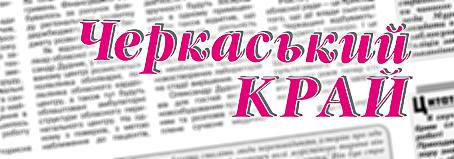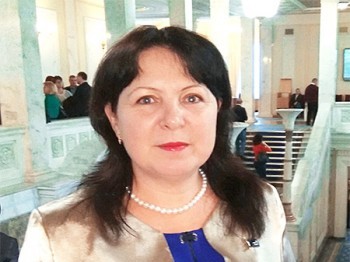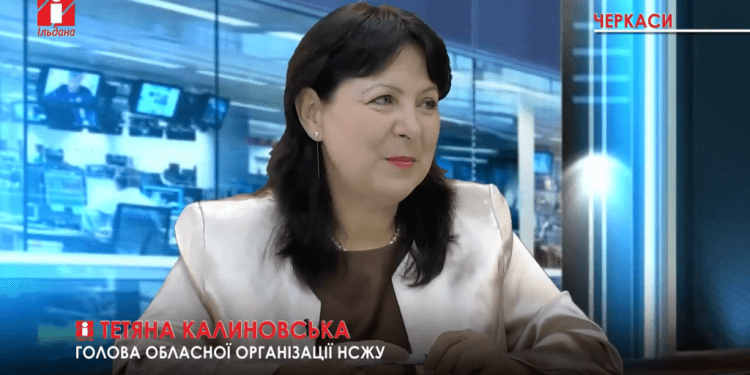It was a grim morning for all of Ukraine, including the team at the “Cherkaskyi Krai” newspaper. As streams of vehicles rushed chaotically towards the borders for departure from the country, the editorial team convened for an unplanned meeting. The chief editor, Tetiana Kalinovska, knew that they would have to work under extraordinary circumstances. To survive, they had to tighten their belts.
Journalists sat around the table, discussing their plans for the future amidst a somber atmosphere. No one intended to abandon the information front.
– We adopted a special approach in news preparation and information presentation, ensuring it doesn’t harm the army or the fighters – complying with all the regulations during the state of war, – Ms. Kalinovska explains. – Within two weeks, we understood that with the onset of war, the newspaper layout would be reviewed by the military administration before printing.
Tetiana Kalinovska states that everyone adapted to the changes without much difficulty. The hardest part was looking colleagues in the eyes and sending them on unpaid leave or even having to let them go. The newspaper had to be published in black and white.
– Each employee had to be sent on unpaid leave for a month. We faced problems with paying utility bills, printing costs, and distribution. We’re cold now because we couldn’t afford heating. We had to let go of two older journalists who now work on a voluntary basis. We also lost our advertising specialist since there’s no advertising, – continues our interlocutor. – The financial situation is extremely challenging. We currently receive a third of our salaries, and the newspaper’s size has decreased from 16 to 8 pages. We’ve abandoned color. However, the black-and-white format seems to be the best fit for the current situation. We decided to publish the newspaper in black and white until victory.

Now, the pages of “Cherkaskyi Krai” feature reports from the combat zone.
– Our journalists, especially the experienced Vasil Marchenko, together with volunteers, went to the frontlines. During these trips, they searched for our fellow countrymen and told their stories – how they fight and how civilians from other regions help them. We present the theme of war through our compatriots, through people familiar to many readers. Our soldiers courageously defend the country, defend us all, and we are obligated to write about it, – the editor asserts.
Local residents value printed media, as it holds their memories.
Tetiana shares an incident, – We had a case where by the time a journalist returned from the front and wrote about our defender, the fighter had already died. Parents came, kissed the newspaper, and thanked us for what we do. We feel a significant need to publish stories about the defenders, and our readers share this sentiment.
During the war, the editor honed her skills and expanded the online version of the newspaper, adopting a Plan B strategy. This approach broadened readership and strengthened information dissemination. Preserving access to local news was crucial for Cherkasy residents, especially those abroad, to stay connected with their homeland.

– We began actively developing the website of ‘Cherkaskyi Krai.’ We created it on a secure platform, and now we use our electronic resources. It helps reach a wide audience since it’s connected to social networks. If our financial problems worsen, or if sustaining the editorial staff becomes difficult, we will shift to the electronic platform, – Tetiana Kalinovska shares her thoughts. – The role of journalists during the war is exceptionally significant, not only because we provide verified information but also because we counteract fake news and misinformation. We tell the truth about what’s happening both in peaceful and tense areas, and we convey accurate information to people through various means.
This series, titled Executed Free Speech, is created as part of a project Drawing Ukrainian And International Audience’s Attention To Serious Violations Of Human Rights And Crimes Against Journalists And Mass Media By The Russian Federation, which is performed by the National Union of Journalists of Ukraine, with support from the Swedish non-profit organization Civil Rights Defenders.
JOURNALISTS ARE IMPORTANT. Stories of Life and Work in Conditions of War is a cycle of materials prepared by the team of the NUJU with the support of the Swedish human rights organization Civil Rights Defenders.
#CRD

 THE NATIONAL UNION OF
JOURNALISTS OF UKRAINE
THE NATIONAL UNION OF
JOURNALISTS OF UKRAINE
















Discussion about this post